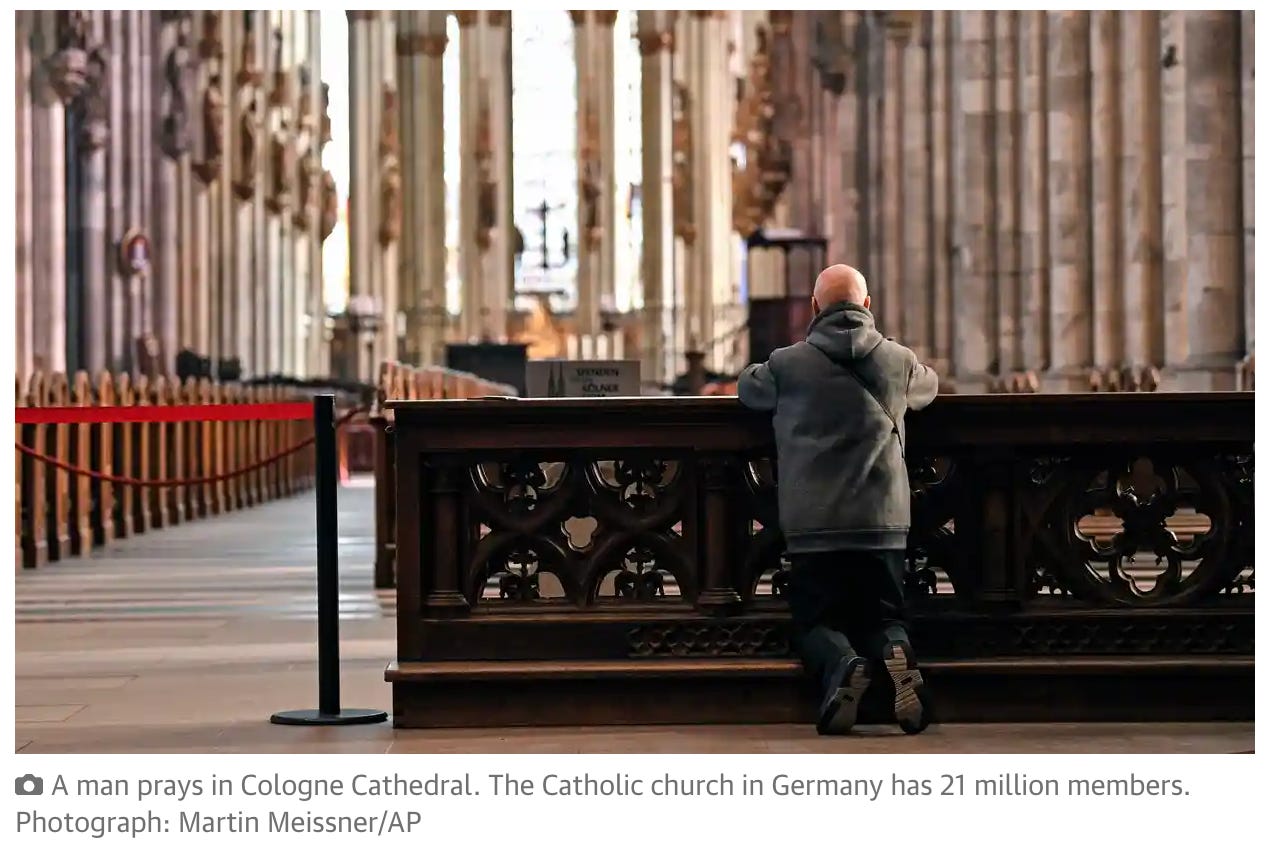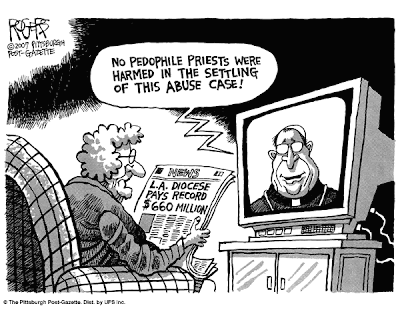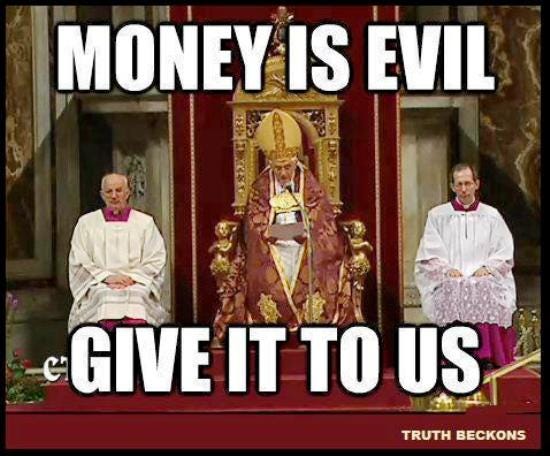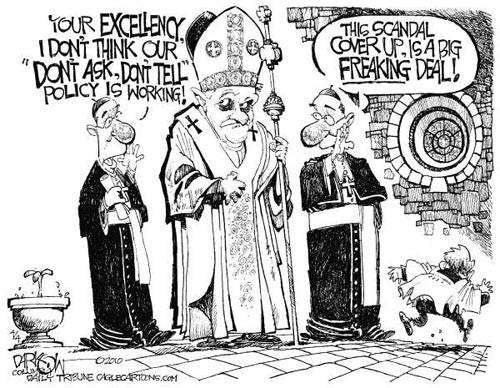The Catholic Church- Dying A Painful (And Perhaps Even Well-Deserved) Death
Corruption, greed, pedophile priests, and cover-ups will do that
The Catholic church is dying a painful death in full view of the public.
Thomas Schüller
As an atheist, I could care less what happens to the Catholic Church, except from the standpoint of the many who are still devoted to the Church. For them, the demise of the Church represents a crisis with no apparent solution. And if you’re a committed Catholic, that might represent a legitimate crisis.
Sadly, it’s a crisis that could easily have been prevented had the Vatican paid attention and managed to keep its house in order. But, thanks to sclerotic, inattentive, and lazy leadership, unimaginable corruption, and a culture that allowed priests to sexually prey upon the vulnerable, the Church is in trouble. And it may be too far gone to save.
I don’t mourn an institution that has always preyed upon the poor and vulnerable- but many do.
The Catholic church in Germany has revealed it is losing followers like never before, with more than half a million people deciding to renounce their membership last year.
According to the Bonn-based German Bishops’ Conference, 522,821 people left the church in 2022, a number far surpassing predictions made by the institution itself and higher than most observers had expected. The previous record year for departures was in 2021, when just under 360,000 people left.
The church has 21 million members, according to 2022 figures, amounting to 24.8% of the population.
The speed of the departures, driven by a series of child abuse scandals and accusations of a widespread cover-up, has shocked clerics.
What’s happening in Germany has causes specific to the country itself, but the decline in Church membership reflects what’s happening worldwide. And the reasons for the worldwide decline are not altogether different from what’s happened in Germany.
When last I checked, Jesus Christ wasn’t big on corruption, dishonesty, sexual abuse, and the misuse of power. Yet that’s precisely what the hierarchy of the Catholic Church has thrived on almost since the Church was founded on the Pentecost.
The overall applicability of religion to people's lives, in general, has contributed to a drop in church membership worldwide. The Catholic Church’s laissez-faire approach to its internal issues has accelerated its decline as Catholics have lost faith in the Church hierarchy due to their dishonesty and lack of integrity.
The Vatican has always held itself above the laws of man and, as such, has never felt the need to answer to legal authorities in the countries in which it operates. Too often, and for too long, the Catholic Church has considered itself above the law and thus untouchable.
According to evidence gathered by authorities, it appears to have accelerated further still since the publication of an expert report on abuse in the archdiocese of Munich and Freising, and discussion surrounding the perceived complicity in the scandal by Pope Benedict XVI, who has since died.
Last year there were legal battles over compensatory payments for victims of abuse in Cologne and Traunstein in upper Bavaria, as well as accusations that Cologne’s cardinal, Rainer Maria Woelki, lied about what he had known about abuse cases and when. Woelki, who was the focus of police raids this week on properties linked to the church, including his own residence, denies the claims.
The Protestant church, which has also been beset by abuse scandals, has similarly been losing members at an alarming rate, with 380,000 people leaving in 2022. According to last year’s figures, it has 19.5 million members in Germany.
Schüller said there were several reasons why people were choosing to leave the Catholic church, but he said the events in Cologne had acted like a “combustive agent”.
If those within a Church can’t feel physically or spiritually safe, why would anyone want to continue to be a part of such a community?
Whether it’s Germany, Ireland, Italy, or the United States, the Vatican has proven itself largely unwilling to admit to the scope and scale of its problems. How does the Church plan to keep pedophiles out of the priesthood? How do they plan to recognize and hold accountable those who’ve been shown to have been sexually abusing children and other vulnerable parishioners?
Do they even acknowledge that they face a serious problem? Years into the revelations from around the world, it’s still not clear that the Vatican takes the problem seriously. Some dioceses have gotten the message and developed processes and procedures to protect their parishioners from sexual predators in priestly vestments. Others continue to shuffle problem priests from post to post to sweep the problem under the rug.
The Catholic Church in Germany has been shamed into bringing the problem into the open, where they’ve discovered that sunshine is the best disinfectant. That’s proven particularly challenging in Germany, where a Catholic’s relationship with the Church is often very formal and codified.
The departures mean a considerable loss of income for the church, which gathers billions of euros in tithes or taxes each year.
All Germans who declare an affiliation to the Protestant, Catholic and Jewish denominations are officially registered as such with their local authorities. They are liable to pay the Kirchensteuer or Kultursteuer (church tax or cultural tax), which amounts to between 8% and 9% of a person’s income tax and is drawn from their monthly income by the tax office, which passes it on to the appropriate denomination.
Those who wish to leave have to officially renounce their membership, a process known as a Kirchenaustritt, or church withdrawal, by actively visiting the local register office and paying a €30 administrative fee.
The church tax was first enshrined in German law in 1919 and reaffairmed in the Reichskoncordat between Nazi Germany and the Vatican in 1933. It was reaffirmed in law again in 1949.
Neighbouring Austria introduced a compulsory tax for Catholics in 1939 after the annexation of Austria into Nazi Germany the previous year, and has retained it since, in what is explained as an effort to keep churches independent of political influence.
As membership declines, it drives a cycle of declining revenue and the need for the Church to shrink its footprint by selling assets- real estate, office buildings, and the like. Without tax-paying members, the Church can’t afford to operate as it has in past years. It will sell assets to continue funding operations in a sort of financial rear-guard action as membership declines and it tries to stave off financial disaster.
I find it difficult to sympathize with the Catholic Church, though. First, their corrupt and immoral approach to their pedophilia scandal was shocking and best and self-serving at worst. Second, the Church has always been too dependent on material goods and the trappings of religious authority.
For an organization supposedly committed to caring for the poor and downtrodden, the Catholic Church is a monument to investing in itself first and foremost. It reeks of wealth and privilege, even as so many in less affluent countries do without. In too many countries, the Church has invested far more in its properties than in attending to those who flock to the Church looking for hope and relief.
This story may be primarily about what’s happening in Germany, but it’s also symptomatic of problems facing the Vatican worldwide. Will the Catholic Church’s stunning corruption and arrogance finally have consequences that reach as high as the Holy See? Or will the Vatican somehow manage to avoid accountability once again?
Is the Catholic Church a legitimate religious faith with a worldwide reach? Or is it a borderline criminal organization that somehow manages to camouflage its myriad scandalous and unlawful activities with piety and holy vestments?
I have my take on those questions, but I ask them legitimately and with curiosity. Is it time for the faithful to realize that they’re being used and have been for centuries? Or can the Catholic Church be reformed and the faith of Catholics restored? Can they once again love and trust the institution they were brought up to revere?
The fact that the Vatican has withstood so many scandals should indicate how much Catholics love the Church and want it to be restored to a place of integrity and hope. For their sake, I hope that’s possible.
For my sake, I’m happy being good without God.










The love of money = the centrality of denialism. 🤷🏻♂️
By the bye, it is "the love of money," not money itself, which is the root of all evil.
The Catholic church remains strong in So. America, but that's hardly enough to keep Papa in new robes. Meanwhile, the intransigently right-wing extremism of so many US B's & C's speaks volumes to the absolute centrality of denialism for many of these people.